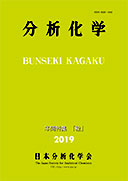
BUNSEKI KAGAKU
metrics 2024
Championing Rigor in Analytical Research
Introduction
BUNSEKI KAGAKU, published by the Japan Society Analytical Chemistry, is a reputable journal dedicated to the field of analytical chemistry. With an ISSN of 0525-1931, this journal has been a crucial outlet for scholarly communication since its inception in 1952, converging its publication years from 1954 to 1957 and from 1959 to 2024. Although it holds a Q4 category ranking in the most recent 2023 quartiles of analytical chemistry and ranks 153/156 in Scopus, it continues to serve as a platform for quality research, fostering advancements in the field. BUNSEKI KAGAKU is based in Tokyo, Japan, and emphasizes the critical importance of analytical techniques in scientific inquiry. With a commitment to professionalism and rigor, the journal provides a vital resource for researchers, students, and professionals seeking to explore innovative methodologies and contribute to the ongoing dialogue in analytical chemistry.
Metrics 2024
 0.12
0.12 0.20
0.20 0.20
0.20 20
20Metrics History
Rank 2024
Scopus
IF (Web Of Science)
JCI (Web Of Science)
Quartile History
Similar Journals
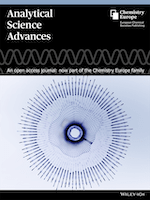
Analytical Science Advances
Advancing the Frontiers of Analytical ChemistryAnalytical Science Advances is a dynamic journal published by WILEY, dedicated to the ever-evolving field of analytical chemistry. With an ISSN of 2628-5452, this open-access platform aims to disseminate high-quality research and insightful reviews that push the boundaries of analytical methodologies and instrumentation. Since its inception in 2020, the journal has gained traction, securing a commendable Q2 ranking in 2023 within its category, highlighting its significance in the scientific community. Currently positioned at Rank #68 out of 156 in Scopus' analytical chemistry category, it boasts a 56th percentile ranking, reflecting its contributions to advancing analytical techniques. Researchers, professionals, and students will find this journal an invaluable resource for keeping abreast of the latest developments, emerging technologies, and innovative approaches in analytical science, ensuring the journal's relevancy and influence in shaping future discoveries.
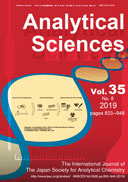
ANALYTICAL SCIENCES
Exploring the Depths of Analytical ExcellenceANALYTICAL SCIENCES, published by SPRINGERNATURE, is a prestigious journal established in 1985 dedicated to advancing the field of analytical chemistry. With an ISSN of 0910-6340 and an E-ISSN of 1348-2246, this journal plays a critical role in disseminating high-quality research and innovative methodologies. Operating from Switzerland, it aims to provide a platform for scholars, researchers, and professionals to explore significant developments and applications in analytical techniques. Although classified in the third quartile (Q3) of analytical chemistry, which places it in a competitive framework (Rank #96/156, 38th Percentile in Scopus), its impact on the discipline is noteworthy. While it is not currently an open-access journal, the resources within are invaluable for those seeking to stay at the forefront of research and practice in analytical sciences, making it an essential read for anyone involved in this dynamic field. The journal continues to converge critical insights from 1985 to 2024, fostering a community dedicated to innovation and excellence in analytical chemistry.

ANALYTICAL AND BIOANALYTICAL CHEMISTRY
Pioneering Innovative Research in ChemistryANALYTICAL AND BIOANALYTICAL CHEMISTRY, published by SPRINGER HEIDELBERG, is a leading international journal that serves as a vital platform for innovative research in the fields of analytical and bioanalytical chemistry. With an impressive impact factor and ranking in the Q2 category for both Analytical Chemistry and Biochemistry, the journal highlights key advancements and methodologies that drive the discipline forward. Established in 1996 and continuing vigorously into 2024, it has gained significant recognition with Scopus rankings placing it in the 83rd and 78th percentiles within its categories, underscoring its impact and relevance. The journal's commitment to open access facilitates widespread dissemination of critical scientific knowledge, making it an essential resource for researchers, professionals, and students dedicated to exploring the complexities of chemical analysis. With its base in Heidelberg, Germany, ANALYTICAL AND BIOANALYTICAL CHEMISTRY continues to inspire and influence the global research community.
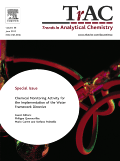
TRAC-TRENDS IN ANALYTICAL CHEMISTRY
Diving Deep into the Latest Methodologies and TechnologiesTRAC - Trends in Analytical Chemistry is a prestigious journal published by Elsevier Science Ltd, situated in the Netherlands. With an impressive impact factor reflected in its Q1 rankings across three major categories—Analytical Chemistry, Environmental Chemistry, and Spectroscopy—this journal stands at the forefront of disseminating pioneering research and advancements in the field of analytical chemistry. Established in 1981, TRAC provides a comprehensive platform for researchers to share influential studies and insights related to the latest trends, methodologies, and technologies in analytical techniques. Recognized globally, the journal excels in fostering cross-disciplinary dialogue and innovation, making it an indispensable resource for academics, professionals, and students alike. Explore the latest issues to stay abreast of cutting-edge developments that shape the analytical sciences.

Journal of Analysis and Testing
Elevating standards in analytical and environmental science.Journal of Analysis and Testing is a premier academic journal published by SPRINGER SINGAPORE PTE LTD, dedicated to advancing the fields of analytical and environmental chemistry. With ISSN 2096-241X and E-ISSN 2509-4696, the journal has established a significant presence since its inception in 2017, converging its focus until 2024. The journal's outstanding rankings in 2023, including Q1 quartile placements in Analytical Chemistry, Instrumentation, and Spectroscopy, underscore its pivotal role in disseminating high-quality research. Researchers can access cutting-edge studies that explore innovative testing methodologies, electrochemical analyses, and material evaluations, making it an essential resource for professionals and students alike. The Journal of Analysis and Testing not only celebrates advances in science and technology but also promotes interdisciplinary collaborations, ensuring widespread impact across analytical and environmental domains. As such, this journal plays a vital role in shaping the future of analytical practices and methodologies, positioning itself as a key conduit for knowledge exchange in the scholarly community.
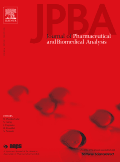
Journal of Pharmaceutical and Biomedical Analysis
Innovative insights for tomorrow's drug discovery.The Journal of Pharmaceutical and Biomedical Analysis, published by ELSEVIER and available in print and online formats, stands as a pivotal source of knowledge in the realms of Analytical Chemistry, Clinical Biochemistry, Drug Discovery, and Pharmaceutical Science. With an ISSN of 0731-7085 and an e-ISSN of 1873-264X, this journal is dedicated to publishing high-quality research that advances the understanding and development of analytical techniques in pharmaceuticals and biomedicine. The journal has earned a solid reputation, reflected in its Q2 category rankings across five distinct fields for 2023, and boasts impressive Scopus rankings, signaling its robust impact within the academic community. The Journal of Pharmaceutical and Biomedical Analysis serves as an essential resource for researchers, professionals, and students alike, providing actionable insights and fostering innovation that can directly influence future advancements in drug development and biomedical applications.
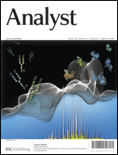
ANALYST
Fostering Interdisciplinary Collaboration for a Better TomorrowANALYST, published by the Royal Society of Chemistry, stands as a prestigious journal in the fields of Analytical Chemistry, Biochemistry, Electrochemistry, Environmental Chemistry, and Spectroscopy. Esteemed for its rigorous peer-review process and influential contributions to the advancement of scientific knowledge, the journal has been a vital resource for researchers and professionals since its inception in 1876. With an impressive Scopus ranking that places it in the top quartile for several chemical disciplines, it specifically ranks #12 in Spectroscopy and #31 in Analytical Chemistry, reflecting its robustness and relevance in the analytical sciences. Though currently not an Open Access publication, ANALYST provides valuable insights and cutting-edge research that help drive innovation and discovery in various scientific realms. Researchers and students alike will benefit from its commitment to disseminating high-quality research that addresses contemporary challenges and promotes interdisciplinary collaboration.

CHINESE JOURNAL OF ANALYTICAL CHEMISTRY
Advancing Analytical Excellence in ChemistryCHINESE JOURNAL OF ANALYTICAL CHEMISTRY, published by SCIENCE PRESS in China, stands as a prominent platform in the field of analytical chemistry since its inception in 1989. With its ISSN 0253-3820 and E-ISSN 1872-2040, the journal maintains a vital role in disseminating empirical research and innovative methodologies, contributing to the advancement of analytical techniques and their applications. The 2023 Scopus ranking positions the journal in the third quartile (Q3) within its category, reflecting a respectable standing among its peers. Researchers, professionals, and students alike engage with a broad range of topics, from instrumental analysis to environmental monitoring, each aiming to foster further scientific inquiry. Although it does not currently offer Open Access, the journal's rich repository of knowledge continues to be an essential resource for those in the analytical chemistry community, with an enduring commitment to scientific excellence and collaboration.
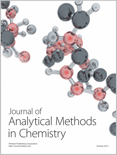
Journal of Analytical Methods in Chemistry
Pioneering research in the realm of analytical chemistry.The Journal of Analytical Methods in Chemistry, published by HINDAWI LTD, stands as a premier platform dedicated to the dissemination of research in the vibrant field of analytical chemistry. With an ISSN of 2090-8865 and an E-ISSN of 2090-8873, this Open Access journal has been committed to providing unrestricted access to quality research since 1978, thereby fostering greater collaboration and innovation among researchers, professionals, and students globally. The journal showcases rigorous research insights spanning diverse categories, earning impressive Scopus rankings including Q2 in Chemical Engineering and Q3 in Analytical Chemistry for 2023, positioning itself effectively among respected peers. Its interdisciplinary approach also covers significant contributions in the realms of instrumentation and computer science applications, thus addressing contemporary challenges and advancements in analytical methodologies. By bridging theoretical underpinnings with practical applications, the Journal of Analytical Methods in Chemistry aims to catalyze knowledge exchange while enhancing the global discourse in analytical science.
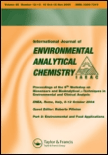
INTERNATIONAL JOURNAL OF ENVIRONMENTAL ANALYTICAL CHEMISTRY
Driving innovation in environmental analysis.INTERNATIONAL JOURNAL OF ENVIRONMENTAL ANALYTICAL CHEMISTRY, published by Taylor & Francis Ltd, stands as an essential resource in the interdisciplinary field of environmental science and analytical chemistry. With a history dating back to 1971 and a convergence period extending to 2024, this journal addresses urgent global challenges by providing a platform for high-quality research that encompasses pivotal aspects of environmental analysis, pollution, and public health. The journal’s significant impact is reflected in its 2023 rankings, placing it in the second and third quartiles across various relevant categories, including Analytical Chemistry, Environmental Chemistry, and Water Science and Technology. Researchers and practitioners are encouraged to contribute to its wealth of knowledge, making it a vital reference for emerging studies in Health, Toxicology and Mutagenesis and beyond. Although it is not an open-access journal, subscriptions provide unparalleled access to groundbreaking research that can influence both academia and industry practices.